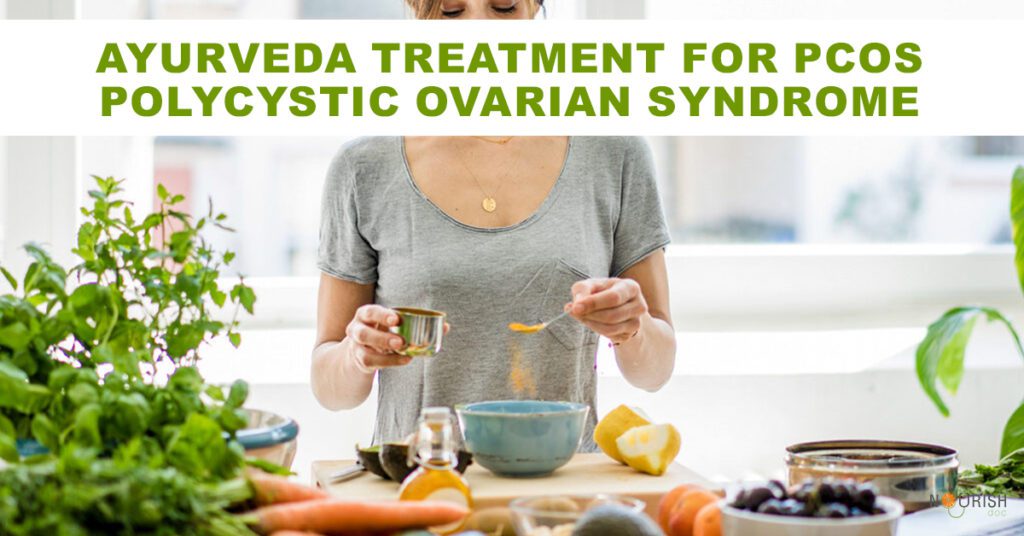Science and Research
PCOS or Polycystic Ovarian Syndrome is a hormonal disorder. It is primarily seen in women of reproductive age. Do you know why the term ‘syndrome’ has been used to represent this disease? It’s because this disease presents itself with a complex manifestation thereby showing so many symptoms and affecting different target organs.
A 19 years girl presented with oligomenorrhea (infrequent menses 5 or 6 per year) and complained of weight gain associated with facial hair growth. Facial hair is the result of Hyperandrogenism which can be assessed by reliable assays. Her main concern about weight gain and irregular menses was addressed first.
What is PCOS?
How can Ayurveda successfully treat PCOS with the use of herbs? This article addresses how the use of herbs, diet, and exercises can cure the symptoms of PCOS.
PCOS is characterized by the following symptoms/ factors.
-
– Obesity
-
– Insulin Resistance
-
– Abnormal Menstrual cycle
-
– Anovulation
-
– Elevated levels of male hormones/androgen resulting in hirsutism i.e. excess face and body hair
-
– Complications can result in infertility, Miscarriage/Premature birth, Type 2 diabetes, depression, and anxiety, etc.
We cannot give a typical correlation for PCOS in Ayurveda. But, it can be considered under ‘Yoni Vyapat’ or uterovaginal disorders.
Another popular correlation of PCOS among the Ayurveda community is Pushpagni Revati (by Scholar Kashyapa in Kashyapa Samhita).
Ayurvedic approach to PCOS treatment
Ayurveda approach to PCOS
It is an interesting fact that the symptoms of PCOS are not compiled as a syndrome in Ayurveda, but it is mentioned as different symptoms of different diseases affecting the uterus or Vagina.
|
Disease mentioned in Ayurveda |
Classical symptoms found in PCOS |
|
Artava Vyapad/ Yoni Roga |
Menstrual Irregularities |
|
Vandhyatwa or Infertility |
Anovulation |
|
Sthoulya |
Obesity |
|
Mukhadooshika |
Acne |
|
Prameha as a complication of Sthoulya |
Hyperinsulinemia leading to Type 2 Diabetes |
As per Ayurveda, a fluctuation or variation of any of the three doshas says Vata, Pitta, and Kapha can lead to a disease condition. In PCOS, the deranged or been vitiated dosha is Vata. When Vata gets vitiated, the following tissues get affected – Mamsa or Muscle tissue, Rakta or blood tissue, and Meda or Fat tissue. These affected tissue gets combined with Kapha dosha and granthi or swelling is formed. This swelling can be compared to a cyst in the modern perspective which develops in the Ovaries.
See: Ayurveda Herbs & Treatment For Sleep
The ayurvedic treatment approach to PCOS
Primarily correcting the vitiated doshas and tissues are given importance.
-
Deepana Pachana – Regulating Agni Mandhya or weakened digestive fire
-
Panchakarma therapies based on the vitiated dhathus or grade of vitiation of doshas
-
Medicines which pacify Vata & Kapha
So, for this girl we advised the following herbs and preparations as internal medication.
Internal Medications advised –
-
Varanadi Kashayam for obesity management and reducing the size of the cyst
-
Panchakola choorna for improving metabolism
-
Arogyavardhini Vati
-
Ashwagandha Ksheerakashaya
Varanadi Kashayam is an Ayurvedic herbal preparation used for treating diseases associated with an imbalanced Kapha like faulty digestion and metabolism, obesity, internal abscesses, abdominal lump, etc. Among the 16 herbs in the Varanadi Kashaya, the 3 main ingredients are Varana (Crataeva nurvala, Shathavari (Asparagus racemosus) and Chitraka (Plumbago zeylanica).
Herbs for PCOS
The action of herbs in PCOS is to clear the obstruction in Pelvis, regulates metabolism and maintaining the proper menstrual cycle. The herbs we chose should be Kapha reducing and hormone balancing. 1
The herbs commonly used in practice are the following –
-
Triphala and Guggulu (the bitter principles help in breaking the pathophysiology) helps in weight reduction 2
-
Chitraka (Plumbago zeylanica) and ginger help in improving digestion and assimilation and helps in correcting the Ama dosha.
-
Varuna (Crataeva nurvala) helps to clear the channel and reduce the size of the cyst.
-
Shathavari (Asparagus racemosus) and Aswagandha (Withania somnifera) are two powerful herbs that are used for the successful management of PCOS.
Let us check out the action of each of these herbs in PCOS.
Effect of Triphala in PCOS
The recent data on pharmacological action of this formula has found to be potentially effective for various clinical uses like appetite stimulation, anti-inflammatory, immunomodulating, hypoglycemic etc.7
In PCOS, Triphala acts effectively for managing insulin resistance and obesity.
Effect of Chitraka in PCOS
A study on Chitraka antihyperlipidemic effect of the aqueous extract. It is evidenced that the use of aqueous extract significantly reduces cholesterol and triglyceride levels thereby reducing obesity and improving metabolism in PCOS.6
Effect of Guggulu in PCOS
The phytoconstituents of Guggulu (Commiphora Mukul) include Guggulusterone which has hypolipidemic & hypoglycemic activity. In addition, the Cembranoids Control the gastrointestinal absorption of fat and cholesterol. 8
Effect of Shathavari in PCOS







